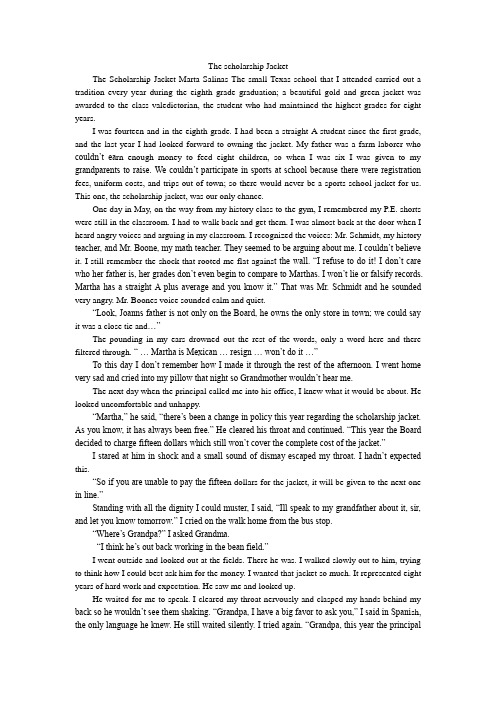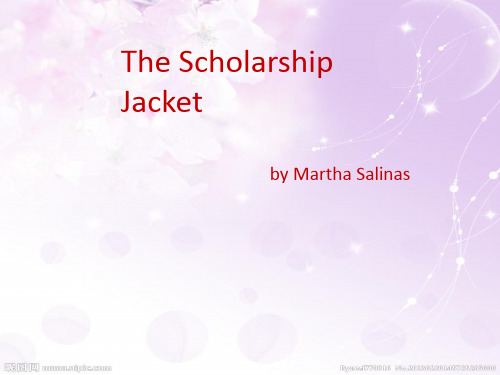The Scholarship Jacket 大学英语课文B篇
- 格式:pptx
- 大小:65.58 KB
- 文档页数:14

大学英语读写译教程1B篇1到5单元以及补充材料B1“Children all over the world speak their native language!” Dr. Shinichi Suzuki, a Japanese violinist, was excited with his great discovery. If all children can learn language, then all children can learn. This simple thought was the beginning of “the Mother Tongue Approach”, a teaching method that has changed music teaching and other talent education around the world.“全世界的儿童都说他们自己的母语!”铃木镇一博士,一位日本小提琴家对他这一伟大发现感到兴奋。
如果所有的儿童能学会说语言的话,那么这些儿童也能够学习其他的东西。
这种简单的思想就是“母语教学法”的开端。
这一教学法改变了全世界音乐教学以及其他才能培养的教学方法。
So how does a baby learn to speak language? The baby listens and watches for a long time before he speaks his first clear word. Parents and others encourage the baby constantly. No one thinks of pushing him to compete with others. By listening and copying those around him, he becomes very skilled at the language, long before he learns reading or writing.那么婴儿是怎么学会说话的呢?婴儿在他说出他的第一个清晰的单词之前要聆听和观察很长一段时间。

The scholarship JacketThe Scholarship Jacket Marta Salinas The small Texas school that I attended carried out a tradition every year during the eighth grade graduation; a beautiful gold and green jacket was awarded to the class valedictorian, the student who had maintained the highest grades for eight years.I was fourteen and in the eighth grade. I had been a straight A student since the first grade, and the last year I had looked forward to owning the jacket. My father was a farm laborer who couldn’t ea rn enough money to feed eight children, so when I was six I was given to my grandparents to raise. We couldn’t participate in sports at school because there were registration fees, uniform costs, and trips out of town; so there would never be a sports school jacket for us. This one, the scholarship jacket, was our only chance.One day in May, on the way from my history class to the gym, I remembered my P.E. shorts were still in the classroom. I had to walk back and get them. I was almost back at the door when I heard angry voices and arguing in my classroom. I recognized the voices: Mr. Schmidt, my history teacher, and Mr. Boone, my math teacher. They seemed to be arguing about me. I couldn’t believe it. I still remember the shock that rooted me flat agains t the wall. “I refuse to do it! I don’t care who her father is, her grades don’t even begin to compare to Marthas. I won’t lie or falsify records. Martha has a straight A plus average and you know it.” That was Mr. Schmidt and he sounded very angry. Mr. Boones voice sounded calm and quiet.“Look, Joanns father is not only on the Board, he owns the only store in town; we could say it was a close tie and…”The pounding in my ears drowned out the rest of the words, only a word here and there filtered through. “ … Martha is Mexican … resign … won’t do it …”To this day I don’t remember how I made it through the rest of the afternoon. I went home very sad and cried into my pillow that night so Grandmother wouldn’t hear me.The next day when the principal called me into his office, I knew what it would be about. He looked uncomfortable and unhappy.“Martha,” he said, “there’s been a change in policy this year regarding the scholarship jacket. As you know, it has always been free.” He cleared his throat and continued. “This year the Board decided to charge fifteen dollars which still won’t cover the complete cost of the jacket.”I stared at him in shock and a small sound of dismay escaped my throat. I hadn’t expected this.“So if you are unable to pay the fiftee n dollars for the jacket, it will be given to the next one in line.”Standing with all the dignity I could muster, I said, “Ill speak to my grandfather about it, sir, and let you know tomorrow.” I cried on the walk home from the bus stop.“Where’s Grandpa?” I asked Grandma.“I think he’s out back working in the bean field.”I went outside and looked out at the fields. There he was. I walked slowly out to him, trying to think how I could best ask him for the money. I wanted that jacket so much. It represented eight years of hard work and expectation. He saw me and looked up.He waited for me to speak. I cleared my throat nervously and clasped my hands behind my back so he wouldn’t see them shaking. “Grandpa, I have a big favor to ask you,” I said in Spani sh, the only language he knew. He still waited silently. I tried again. “Grandpa, this year the principalsaid the scholarship jacket is not going to be free. It’s going to cost fifteen dollars and I have to take the money in tomorrow, otherwise it’ll be given to someone else.” The last words came out in an eager rush. I waited, desperately hoping he’d say I could have the money.He turned to me and asked quietly, “What does a scholarship jacket mean?”I answered quickly; maybe there was a chance. “It means you’ve earned it by having the highest grades for eight years and that’s why they’re giving it to you.”Too late I realized the significance of my words. Grandpa knew that I understood it was not a matter of money. It wasn’t that. He went back to hoeing the weeds that sprang up between the delicate little bean plants. Finally he spoke again.“Then if you pay for it, Marta, it’s not a scholarship jacket, is it? Tell your principal I will not pay the fifteen dollars.”I walked back to the house and locked myself in the bathroom for a long time. I was angry with Grandfather even though I knew he was right, and I was angry with the Board, whoever they were. Why did they have to change the rules just when it was my turn to win the jacket?It was a very sad a nd withdrawn girl who dragged into the principal’s office the next day.“What did your grandfather say?”I sat very straight in my chair.“He said to tell you he won’t pay the fifteen dollars.”“Why?” he asked. “Your grandfather has the money. Doesn’t he own a small bean farm?”I looked at him, forcing my eyes to stay dry. “He said if I had to pay for it, then it wouldn’t bea scholarship jacket,” I said and stood up to leave. I was almost to the door when he stopped me.“Martha ---wait.”I turned and looked at him, waiting. He looked at me, biting his lip, as if thinking.“Okay, damn it. Well make an exception in your case. I’ll tell the Board. You’ll get your jacket.”I could hardly believe it. I spoke in a trembling rush. “Oh, thank you, sir!” Sudde nly I felt great. I wanted to yell, jump, run the mile, do something. I ran out so I could cry in the hall where there was no one to see me. At the end of the day, Mr. Schmidt winked at me and said, “I hear you’re getting a scholarship jacket this year.”His face looked as happy and innocent as a baby, but I knew better. Without answering I gave him a quick hug and ran to the bus. I cried on the walk home again, but this time because I was so happy. I couldn’t wait to tell Grandpa and ran straight to the fi eld.“The principal said he’s making an exception for me, Grandpa, and I’m getting the jacket after all. That’s after I told him what you said.”Grandpa didn’t say anything; he just gave me a pat on the shoulder and a smile.。

大学英语教材textb翻译TEXTB is a college English textbook widely used in universities across the country. It is designed to enhance students' English proficiency in various aspects including listening, speaking, reading, and writing. This article aims to provide a comprehensive translation of the key components of TEXTB, allowing readers to have a better understanding of its contents.Unit 1: Introduction to EnglishThis unit serves as a warm-up to the entire textbook. It introduces the importance of learning English in the modern world and provides an overview of the course structure. The focus is on developing students' motivation and interest in English learning.Unit 2: Grammar and VocabularyThis unit covers essential grammar rules and vocabulary. It starts with basic sentence structure and gradually progresses to more complex sentence patterns. Moreover, it introduces a variety of vocabulary related to different topics, such as education, travel, and technology. This unit aims to help students lay a solid foundation of English language skills.Unit 3: Reading ComprehensionIn this unit, students are exposed to a wide range of texts, including articles, essays, and short stories. The texts are carefully selected to improve students' reading comprehension abilities, as well as their critical thinking skills. Students are encouraged to actively engage with the texts and analyze the content, structure, and writing techniques used.Unit 4: Listening and SpeakingUnit 4 focuses on improving students' listening and speaking skills. Various listening exercises, such as listening to conversations, lectures, and interviews, are provided to help students develop their listening comprehension abilities. Additionally, speaking activities including group discussions, presentations, and role-plays are incorporated to enhance students' oral communication skills.Unit 5: Writing SkillsWriting skills are essential in academic and professional contexts. Unit 5 covers different types of writing, such as emails, letters, essays, and reports. Students are guided through the writing process, from brainstorming ideas to organizing the structure and polishing their final drafts. Real-life writing tasks are provided to make the learning experience more practical and relevant.Unit 6: Cultural AwarenessUnderstanding different cultures is an integral part of learning a foreign language. Unit 6 introduces students to the cultural aspects of English-speaking countries. It covers topics such as traditions, customs, holidays, and social etiquette. By exploring cultural topics, students not only broaden their knowledge but also foster cross-cultural understanding.Unit 7: Test PreparationIn the final unit, students are provided with test-taking strategies and practice materials. This unit helps students prepare for various English proficiency tests, such as the TOEFL or IELTS. It includes tips for effectivetest management, time allocation, and familiarizes students with the test format.In conclusion, TEXTB is a comprehensive college English textbook that covers all essential language skills. From grammar and vocabulary to reading, listening, speaking, and writing, it equips students with the necessary tools to excel in English. Additionally, cultural awareness and test preparation are integrated to provide a well-rounded English learning experience. TEXTB is undoubtedly a valuable resource for students aiming to improve their English proficiency.。



UNIT1马尔科姆·艾克斯是一位非裔美国民权活动家、宗教领袖、作家和演说家。
他生于1925 年,1965 年被神秘地暗杀。
在他去世之前,他对自己生平的自述——《马尔科姆·艾克斯自传》已闻名遐迩。
他出生于一个贫民家庭,取名马尔科姆·利特尔。
后来,他加入了一个叫“伊斯兰民族”的组织,之后改名为马尔科姆·艾克斯。
“伊斯兰民族”是个宗教团体,它改变了美国主流伊斯兰教的一些主要的习俗和信仰,使之更适用于19 世纪60 年代早期非裔美国人的特定情况。
马尔科姆·艾克斯因当时犯有诸如偷窃等罪而入狱。
他在监狱里得知了“伊斯兰民族”组织。
由于没有受过良好的教育,他在向别人传授他的新信仰时感到力不从心。
作为一名年轻人,他可以用草根语言来概述自己的想法,语言简单、粗浅、语法差劲,且词汇贫乏。
可作为一名成年人,当他在大型公众集会上向人们阐述他的新信仰时,他发觉自己缺少了所需的语言交流技能。
用他自己的话说,他“甚至没有这个功能”。
为了增长知识,提高沟通技能,深陷绝望的马尔科姆·艾克斯为自己制定了一个计划。
他决定求助于书籍,相信书会使他受益匪浅。
可是当他试图阅读一些严肃的书本时,他不禁倍感苦恼,因为大部分的词他都不认识。
他写道:“这些书还不如是用中文写的。
”他跳过了所有不认识的词,可是最终他全然不知这本书里写了什么。
马尔科姆·艾克斯在他的自传里谈到他贫乏的语言技能时是这样写的:“我变得沮丧起来。
”由于无法阅读和写作所遭受的巨大挫折促使马尔科姆·艾克斯开始探索如何攻克自己的语言缺陷。
他说:“我明白我所能做的就是弄到一本词典来学习,学一些单词。
”他也幸运地意识到应该尝试去改进他的书写。
他告诉我们:“令人伤心的是我甚至不能把英文书写得整齐。
”这些想法促使他向狱管请求,要了一些纸和铅笔。
头两天,马尔科姆·艾克斯只是很快地浏览了一下词典,试图在这不熟悉的格式里寻找出他自己的应付方法。
第一册第一单元成长课文B夏天打工时,作者常常替巴卢先生修剪草坪。
惟一的问题是,巴卢先生似乎从来没钱支付工钱。
然而,他实际上所给予的却远比工钱珍贵。
夏日阅读迈克尔·多里斯十四岁那年,我在暑假里替人修剪草坪挣些钱,不出几个星期,我就有了不少客户。
客户们种植的花卉我得记住不能剪去,他们会将东西遗落在草地上或故意插在地里,通过这些我逐渐认识了他们。
我对大多数客户了解至深,事先就能知道他们会抱怨些什么,哪些特别的要求不能掉以轻心。
(1)而且,我从邻居偏爱的付款方式中了解到了一点他们的情况:有的按干的活儿给钱,有的按月支付——或者有的压根儿不付钱。
巴卢先生属于最后一类,而且他总有理由。
有一天他兑不开一张五十元的钞票,又有一天他支票用完了,还有一天我上门时他干脆就溜出去了。
撇开钱这档子事,他倒也还是个挺不错的老头,每次看见我,老远就挥手或脱帽致意。
我猜他退休金不多,可能出过工伤,整不了自己的园子。
没错,我全都记着帐,可我对这点钱并没太在意。
(2)也就是剪剪草,何况巴卢先生住宅外面的那一点草坪修剪起来花不了多少时间。
到了一年中最热的七月中旬,一天傍晚前,我走过他家,他开了门,示意我进去。
门厅里凉凉的,帘子遮去了阳光,过了一会儿我的眼睛才适应室内的暗淡光线。
“我欠你工钱,”巴卢先生开口道,“不过……”我想省得他费神找新的借口了,就说,“没事。
别放在心上。
”“银行把我的账弄错了,”他没理我的碴儿,接着说。
“一两天里就会改过来。
在这当儿,我想你不妨挑——两本书作为我的首付款。
”他朝墙那边指了指,我这才发现到处都堆着书。
就跟图书馆一样,只不过没有分门别类罢了。
“别着急,”巴卢先生鼓动说。
“读也好,借也好,留着也行。
找你喜欢的。
你平常都爱读什么书啊?”“我不知道。
”我的确不知道。
我通常是弄到什么就读什么,从药房里买到的平装书,图书馆里借得到的书、杂志,到麦片包装盒背面的说明,还有连环漫画,什么都看。
有意识地找出一本特别的书来读对我是件新鲜事,不过我觉得这主意挺不错——于是我开始在书堆中翻找起来。
AppendixⅡChinese Translations of Texts B (Units 1-8)参考译文第一单元学习方式课文B设法教育孩子珍惜钱财会是件难事。
然而,大卫?欧文说,方法也很简单——开个银行就行。
说来容易做起来难?其实,这事并没听上去那么难,你读一读戴夫第一国家银行的故事就知道了。
孩子与金钱大卫. 欧文当家长觉得该教孩子们懂得如何对待金钱的时候,他们通常先为孩子开个储蓄账户。
刚开始的时候,孩子们颇感兴趣,因为他们想自己什么也不干银行还会付给他们钱,,可当他们明白利率小得很,而且父母也无意让他们动用本金时,他们的热情一下子就冷却了。
对一个孩子来说,一个储蓄账户只不过是一个吞没其生日礼金支票的黑洞。
孩子:“奶奶给了我25美金!”家长:“太棒了。
咱们把支票直接存到你的账户上去。
”孩子:“可这钱她是给我的!我要用!”家长:“嗳,钱还是你的嘛。
你只不过是要把钱放在银行里,好让它增多。
”孩子(狐疑地):“你说…增多‟是什么意思?”家长:“哦,要是你把这25美金在银行里放一年,银行就会付给你75美分。
要是你连本带息在银行里再放一年,银行会再付给你75美分,另加2.5美分。
这叫做复利。
这钱能帮你上大学。
” ‟这类储蓄计划的主要缺陷在于,孩子本人一无所获。
上大学还不知要过多少年,他们或许会想他们宁愿呆在家里。
实际上,这类计划的真正目的通常不是促进储蓄而是限制消费。
(1)孩子们在糖果、电子游戏上的花费之大令家长们十分震惊(或者更确切地说,孩子们的超支行为似乎是在竭力仿效父母、这令家长们十分震惊),于是家长便设法把孩子们的钱存起来不让用。
毋怪乎孩子们很快就认定,大额钱款不是实实在在的钱,有了现钱要么赶紧花掉,要么藏在抽屉里。
为了避免我的两个孩子产生这——问题,我开设了自己的银行,名叫戴大第一国家银行。
我用记录自己支票簿使用情况的同—个电脑程序给每个孩子开了一个账户。
因为我希望孩子存款增长的速度足以引起他们的注意,便给他们一个诱人的利率——月息5厘。
全新版大学英语第3册课文B翻译第一篇:全新版大学英语第3册课文B翻译Chinese Translations of Texts B(Units 1-8)参考译文第一单元生活方式的改变课文B 唐娜·巴伦描述了美国家庭生活近几年来的变化。
她指出有三种力量在起作用。
是哪三种力量?请读本文。
读后问一下自己,同样的力量在中国是否也在起作用。
中国的家庭生活最终是否会朝着同一个方向变化? 美国家庭生活:变化中的景象唐娜·巴伦这是美国家庭一个寻常的傍晚。
门在5:30准时推开。
“嗨,亲爱的!我回来了!”亲爱的老爸走了进来,他在办公室上了一天的班,肚子饿了,人也累了。
迎接他的是系着围裙的妈妈,三个快乐的孩子以及炖肉诱人的香味。
全家人从容地吃完饭后,妈妈就刷洗碗碟。
反正这是她的活。
接着全家人聚在起居室。
一个晚上大家玩玩牌,看看电视。
随后各自上床睡觉。
第二天早上,爸爸和孩子们在妈妈准备早餐发出的声响和薄饼、香肠散发的香味中醒来。
(1)什么?你说那听起来不像你府上的生活?其实,不仅仅是你一个人这么想。
事实上,大多数人很可能都跟你一样这么想的。
上面描述的家庭可以说在美国曾一度相当典型。
如今你仍能见到这样的家庭——不过得在电视里。
只要看一看那些重播的情景剧老片子。
(2)例如,《交给比弗吧》一剧中妈妈戴着珍珠项链、穿着高跟鞋做家务。
爸爸整个周末都穿着西装,戴着领带。
但像比弗.克立弗那样的家庭越来越少了。
那样的家庭正在消失,因为我们生活中的三个部分发生了变化:我们的工作方式、餐饮方式以及娱乐方式。
了解这些变化所带来的影响也许有助于我们改善家庭生活。
我们先来看一下我们工作方式的变化。
今天,“嗨,亲爱的,我回家了!”这句话可能不是出自亲爱的老爸之口。
亲爱的老妈也同样可能说这句话。
在上一代,大多数家庭可以靠一份工资——爸爸的工资——维持。
妈妈呆在家里,至少在孩子上学前是如此。
但今天,一半以上有幼儿的母亲外出工作。
在职人员中有大孩子的母亲的比例更高。
《大学英语1》课程教学大纲英文名称:New College English ( Second Edition)课程编号:06110040课程类别:必修总学时数:256(理论学时:实验或实践学时:)学分:16开课单位:衢州学院适用专业:本校非英语专业一年级本科生一、课程的性质、目的和任务1.课程性质大学英语课程是大学生的一门必修的基础课程。
大学英语教学是以英语语言知识与应用技能、学习策略和跨文化交际为主要内容,以外语教学理论为指导,并集多种教学模式和教学手段为一体的教学体系。
2.课程目标和任务大学英语基础阶段的教学目标是帮助学生打下较扎实的语言基础,掌握良好的语言学习方法,增强自主学习能力,提高综合文化素养,使他们具有较强的英语综合应用能力,特别是英语口头表达能力,能用英语有效地进行信息交流,以适应社会发展、经济建设和国际交流的需要。
二、课程教学内容及教学要求Unit One Growing Up1.教学内容1)Listening Task2) Text A Writing for Myself3) Text B The Scholarship Jacket4) Comprehensive Language Practice2.重点、难点重点:Comprehension of Text A难点:Master the words, expressions and sentence structures in Text A3.教学基本要求1) grasp the main idea ( the essence of writing is to write what one enjoys writing) and structure of Text A ( narration in Chronological sequence);2) appreciate the narrative skills demonstrated in Text A ( selection of details, repetition, coherence);3)master the key language points and learn how to use them in context;4)understand the cultural background related to the content;5)express themselves more freely on the theme of Growing up after doing aseries of theme-related reading, listening , speaking and writing activities;6)write a letter of congratulations in an appropriate way.Unit Two Friendship1.教学内容1)Listening Task2) Text A All the Cabbie Had Was a letter3) Text B Never Let a Friend Down4) Comprehensive Language Practice2.重点、难点重点:Comprehension of Text A难点:Master the words, expressions and sentence structures in Text A3.教学基本要求1) grasp the main idea (never delay expressing your true feelings to a friend ) and structure of Text A (developing a story around a letter);2) appreciate the narrative skills demonstrated in Text A ( spoken English is much more informal than written English);3) master the key language points and learn how to use them in context;4)understand the cultural background related to the content;5)express themselves more freely on the theme of Friendship after doing aseries of theme-related reading, listening , speaking and writing activities;6)write a personal letter in an appropriate way.Unit Three Understanding Science1.教学内容1)Listening Task2) Text A Public Attitudes Toward Science3) Text B How to Make Sense Out of Science4) Comprehensive Language Practice2.重点、难点重点:Comprehension of Text A难点:Master the words, expressions and sentence structures in Text A3.教学基本要求1) grasp the main idea (to ensure the survival of human civilization, measures must be taken to help the public understand science ) and structure of Text A ( introducing a topic, developing the topic with supporting details, drawing a conclusion);2) appreciate the narrative skills demonstrated in Text A (Text A, Unit 1) and expository writing (Text A, Unit 3);3) master the key language points and learn how to use them in context;4) understand the cultural background related to the content;5) express themselves more freely on the theme of Understanding Science after doing a series of theme-related reading, listening , speaking and writing activities;6) write an expository essay about how science changes our liveUnit Four The American Dream1.教学内容1)Listening Task2) Text A Tony Trivisonno’s American Dream3) Text B With His Own Two Hands4) Comprehensive Language Practice2.重点、难点重点:Comprehension of Text A难点:Master the words, expressions and sentence structures in Text A3.教学基本要求1) grasp the main idea Tony Trivisonno realized his American Dream through his own efforts) and structure of Text A (one part telling the story of Tony’s life and the other giving the author’s comments on it );2) learn to describe a person by his/her characteristic features, together with supporting details which demonstrate the features;3) master the key language points and learn how to use them in context;4) understand the cultural background related to the content;5) express themselves more freely on the theme of The American Dream after doing a series of theme-related reading, listening , speaking and writing activities;6) write a narrative in the third person singular about the story of Tony Trivisonno. Unit Five Work to Live or Live to Work1.教学内容1)Listening Task2) Text A The Company Man3) Text B You Might Be a Workaholic If …4) Comprehensive Language Practice2.重点、难点重点:Comprehension of Text A难点:Master the words, expressions and sentence structures in Text A3.教学基本要求1) grasp the main idea (the author tries to define a typical workaholic in the American corporate world with the story of Phil ) and structure of Text A;2) appreciate the narrative skills demonstrated in Text A (to set the tone of irony by choice of words, selection of details, use of quotation marks, etc.)3) master the key language points and learn how to use them in context;4) understand the cultural background related to the content;5) express themselves more freely on the theme of Work to Live or Live to Work after doing a series of theme-related reading, listening , speaking and writing activities;6) write a letter of sympathy or condolence in an appropriate wayUnit Six Romance1.教学内容1)Listening Task2) Text A A V alentine Story3) Text B The Wallet4) Comprehensive Language Practice2.重点、难点重点:Comprehension of Text A难点:Master the words, expressions and sentence structures in Text A3.教学基本要求1) grasp the main idea (the way one reacts to unattractive people reveals one’s true character) and structure of Text A2) appreciate the narrative skills demonstrated in Text A (switching between tenses ,change of narrators), some rhetorical devices (simile and metaphor) and the use of informal language in conversations3) master the key language points and learn how to use them in context;4) understand the cultural background related to the content;5) express themselves more freely on the theme of Romance after doing a series of theme-related reading, listening , speaking and writing activities;6) write a letter of invitation and acknowledgement in an appropriate wayUnit Seven Animal Intelligence1.教学内容1)Listening Task2) Text A What Animals Really Think3) Text B Do Animals Fall in love?4) Comprehensive Language Practice2.重点、难点重点:Comprehension of Text A难点:Master the words, expressions and sentence structures in Text A3.教学基本要求1) grasp the main idea (some animals seem capable of thinking when it is in their own interests to do so ) and structure of Text A ( introducing, 3 subheadings to give 3 supporting examples, conclusion);2) appreciate the importance of examples in exposition;3) master the key language points in Text A and learn how to use them in context;4) understand the cultural background related to the content;5) express themselves more freely on the theme of Animal Intelligence after doing a series of theme-related reading, listening , speaking and writing activities;6) write an essay about animal intelligence using relevant examples.Unit Eight Educational Problems1.教学内容1)Listening Task2) Text A A fable of the Lazy Teenager3) Text B Ditch the Calculator4) Comprehensive Language Practice2.重点、难点重点:Comprehension of Text A难点:Master the words, expressions and sentence structures in Text A3.教学基本要求1) grasp the main idea ( teenagers’ idleness and ignorance will seriously affect both themselves and society in general) and structure of Text A ( two parts-the author’s concern and his proposed remedy);2) learn how to write a cause-and-effect analysis;3) master the key language points and learn how to use them in context;4) understand the cultural background related to the content;5) express themselves more freely on the theme of Understanding Science after doing a series of theme-related reading, listening , speaking and writing activities;6) write an essay about the use of computers in schools using cause and effect.三、建议学时分配表四、课程考核方式与成绩评定1.考核方式:2.成绩评定:总评成绩构成:平时考核(20 )%;期中考核(20)%;期末考核(60 )%平时成绩构成:考勤考纪(10 )%;作业(10)%;实践环节()%五、建议教材及参考资料建议教材:×××主编,《×××》,××××出版社,××××年版1. 《全新版大学英语》(综合教程1)第二版李荫华主编,上海外语教育出版社,2010年版2. 《全新版大学英语》(听说教程1)第二版虞苏美主编,上海外语教育出版社,2010年版3. 《全新版大学英语》(快速阅读教程1册)第二版郭杰克主编,上海外语教育出版社,2010年版4. 《全新版大学英语》(综合教程1,一课一练)第二版李荫华主编,上海外语教育出版社,2010年版参考资料:1. 《全新版大学英语》(语法手册)第二版张成炜主编,上海外语教育出版社,2010年版2. 《大学英语四级模拟训练》权威出版社最新版本3. 《大学英语四级真题》权威出版社最新版本4. 《全新版大学英语》(综合教程1)第二版教师用书李荫华主编,上海外语教育出版社,2010年版5. 《全新版大学英语》(听说教程1)第二版教师用书虞苏美主编,上海外语教育出版社,2010年版六、大纲说明需要特殊表述的大纲中未尽事宜,如课程改革、整合情况等。